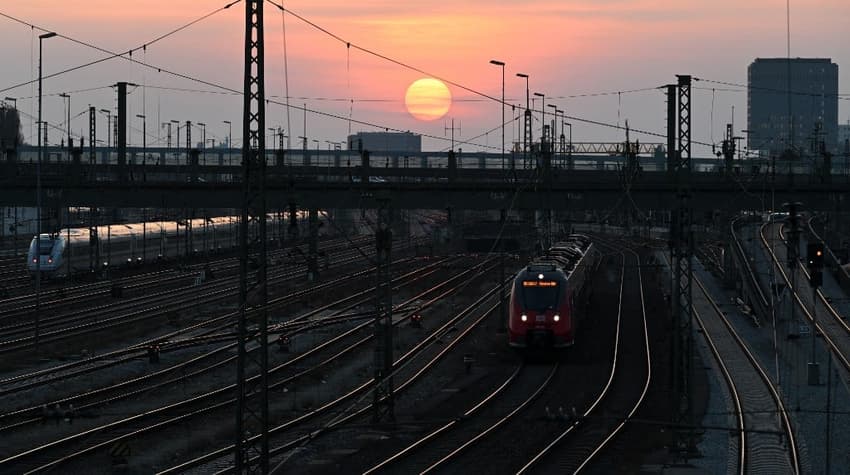What will happen after the €9 ticket offer ends?

Germany's Transport Minister Volker Wissing has praised the success of the low-cost ticket, but what will happen after August, when the offer is set to end? We look at the different opinions.
Wissing declared that the cheap tickets already had "a firm place in the hearts of Germans" when they were launched at the start of June and now he's going even further, calling the coalition's three-month cheap-ticket idea a "resounding success" with significantly less traffic on the roads and fewer traffic jams.
The €9 monthly ticket can be used on many regional trains that cover distances of up to 300 kilometres.
Green Party politician Nyke Slawik is of a similar opinion: "The €9 ticket is already a highlight of our traffic light [Social Democrats (SPD), Greens and the Free Democrats (FDP)] coalition," she said.
According to VDV, the German association of transport companies, over 30 million people across Germany had bought the €9 ticket as of the end of June.
Germany's left-wing party Die Linke are calling for the ticket to be extended to the end of the year and for permanent low-cost prices for bus and train journeys.
"It should be the €1 ticket, that is €1 a day," party head Janine Wissler said in the Bundestag, also calling for bus and train travel to be free of charge in the medium term.
States have previously been said to be considering a €365 annual ticket that would work out at just €1 per day for unlimited local or regional travel.
But the Social Democrats see this expensive idea as "removed from reality".
Dorothee Martin, the transport policy spokesperson for the SPD parliamentary group in the Bundestag, thinks that the key advantage of the €9 ticket lies in its simplicity: "You get on, travel, get off and that's it".
This seems to be in line with Wissing's ideas on the €9 ticket: he wants to bring about an end to what he calls the 'fare jungle' that prevails in Germany.
"If the complicated fare zones disappear and tickets are valid nationwide, local public transport will be used much more," the FDP politician told the Neue Osnabrücker Zeitung.
But he didn't say whether there would still be cheap bus and train offers when the €9 ticket expires at the end of August, explaining that everything would be evaluated first with conclusions drawn from autumn.
The government has already mulled the idea of a 'climate ticket' as a replacement to the cheap transport offer.
According to the government proposals, "a discounted 'climate ticket' as a standardised state local transport monthly or annual ticket for regional rail passenger transport and local public transport" would ensure low-cost rail travel in the future.
"Let's use the summer to find a follow-on solution for the €9 ticket," said the Green Party's Slawik.
But what could that be? How can you make sure you don't lose all the new people who have used buses and trains thanks to the low-cost ticket?
The FDP have all but ruled out the continuation of the low-cost ticket as it's just too expensive and the CDU/CSU remain sceptical about it.
Michael Donth, the Reutlingen CDU Bundestag member, said that cheap tickets wouldn't be any use to poorly connected rural communities anyway. Where he lives in the Swabian Alp in southwestern Germany, there's limited enthusiasm for the ticket.
So, from the neglected rural population to the enormous backlog in the expansion of the rail network, there's a lot to consider when the coalition starts thinking about what could follow the €9 ticket.
Since June 1st, people in Germany have been able to use the €9 ticket to travel on all public buses, trains and trams throughout the country. The ticket is not valid on long-distance trains.
READ MORE:
- Which foreign countries can you visit with Germany's €9 ticket?
- How to explore Germany by train with the €9 ticket
- €9 for 90: Everything you need to know about Germany’s cheap travel deal
- Nine of the best day trips from Frankfurt with the €9 ticket
- Nine of the best day trips from Munich with the €9 ticket
Comments
See Also
But what could that be? How can you make sure you don't lose all the new people who have used buses and trains thanks to the low-cost ticket?
The FDP have all but ruled out the continuation of the low-cost ticket as it's just too expensive and the CDU/CSU remain sceptical about it.
Michael Donth, the Reutlingen CDU Bundestag member, said that cheap tickets wouldn't be any use to poorly connected rural communities anyway. Where he lives in the Swabian Alp in southwestern Germany, there's limited enthusiasm for the ticket.
So, from the neglected rural population to the enormous backlog in the expansion of the rail network, there's a lot to consider when the coalition starts thinking about what could follow the €9 ticket.
Since June 1st, people in Germany have been able to use the €9 ticket to travel on all public buses, trains and trams throughout the country. The ticket is not valid on long-distance trains.
READ MORE:
- Which foreign countries can you visit with Germany's €9 ticket?
- How to explore Germany by train with the €9 ticket
- €9 for 90: Everything you need to know about Germany’s cheap travel deal
- Nine of the best day trips from Frankfurt with the €9 ticket
- Nine of the best day trips from Munich with the €9 ticket
Join the conversation in our comments section below. Share your own views and experience and if you have a question or suggestion for our journalists then email us at [email protected].
Please keep comments civil, constructive and on topic – and make sure to read our terms of use before getting involved.
Please log in here to leave a comment.